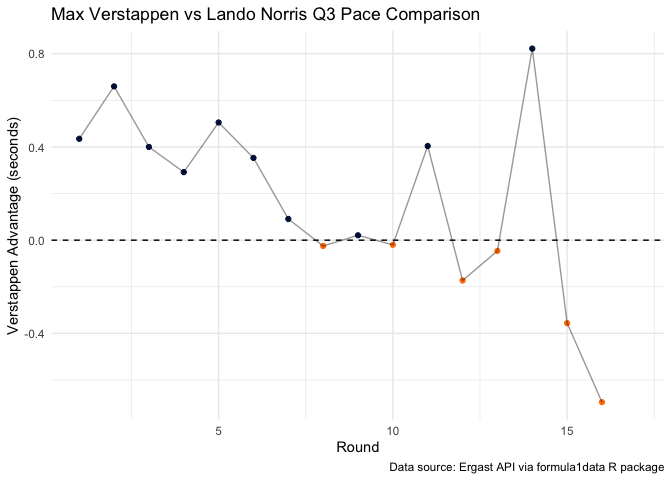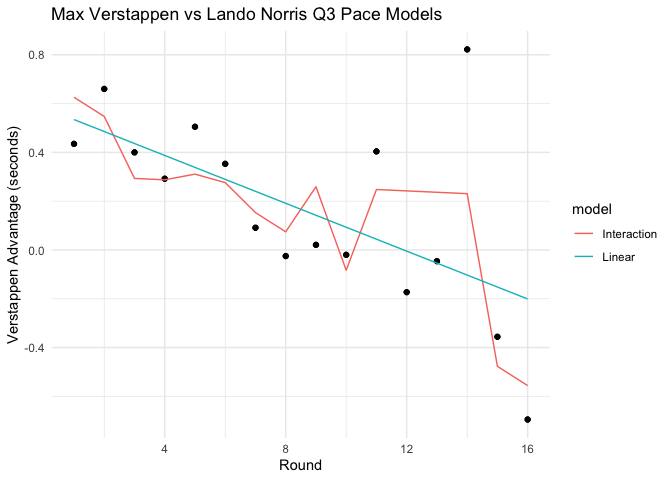Lando Norris’ failure to advance from Q1 in F1 Baku was dramatic. The Briton had to abandon his flying lap after a yellow flag in the last sector forced him to lift. Equally dramatic has been the evolution of Norris’ qualifying form in 2024 vs. Verstappen’s Red Bull.

Clearly, things now are a far cry from Red Bull’s consistent ~0.4s advantage in the first 5 or 6 rounds of the season. But it’s also clearly not a linear trend. And the spikeness of the data leaves me with a natural question: what other factors might be influencing this, and what’s just noise?
2 Models
I started by fitting a linear regression model as a baseline. No other variables, just how much Verstappen’s advantage over Norris changes with each round. Of course, this is a simplification. The trend was statistically significant, but the model only explained about 31% of the variance.
I was curious how different kinds of circuits (front limited vs. rear limited) would affect the perfomance of Verstappen vs. Norris. I coded a column into the data to represent this, and fit a new model with an interaction term. I think the result of this was very interesting:
Call:
lm(formula = verstappen_advantage ~ round + circuit_type + round:circuit_type,
data = ver_nor_24)
Residuals:
Min 1Q Median 3Q Max
-0.41509 -0.15203 0.03384 0.11496 0.59126
Coefficients:
Estimate Std. Error t value Pr(>|t|)
(Intercept) 0.310222 0.233229 1.330 0.2082
round -0.005677 0.023742 -0.239 0.8150
circuit_typerear 0.394455 0.290231 1.359 0.1991
round:circuit_typerear -0.073110 0.029890 -2.446 0.0308 *
---
Signif. codes: 0 '***' 0.001 '**' 0.01 '*' 0.05 '.' 0.1 ' ' 1
Residual standard error: 0.2644 on 12 degrees of freedom
(1 observation deleted due to missingness)
Multiple R-squared: 0.6346, Adjusted R-squared: 0.5432
F-statistic: 6.946 on 3 and 12 DF, p-value: 0.005784
The interaction term being the only statistically significant one in the model is interesting. It suggests that Max’s initial advantage at rear limited circuits is being eroded as the season progresses. And when we control for these variables, the effect of round number itself is no longer statistically significant and has a negligible size.
I don’t know if I fully buy this, but it was the best of several candidate models I tried.

With several rear-limited circuits coming up, Max could be in for a tough time closing out the season. Lando’s qualifying misfortune in Baku could a huge gift and turn down the pressure on Max.
(I didn’t intend for this article to be a code tutorial, but let me know in the comments if you would be interested in seeing a code tutorial or github gist of this for reproducibility)
Star of Qualifying: Franco Colapinto
Shoutout to Colapinto for Qualifying 9th and beating teammate Albon in the Williams. Impressive stuff!
Let’s see how things go in the Grand Prix!